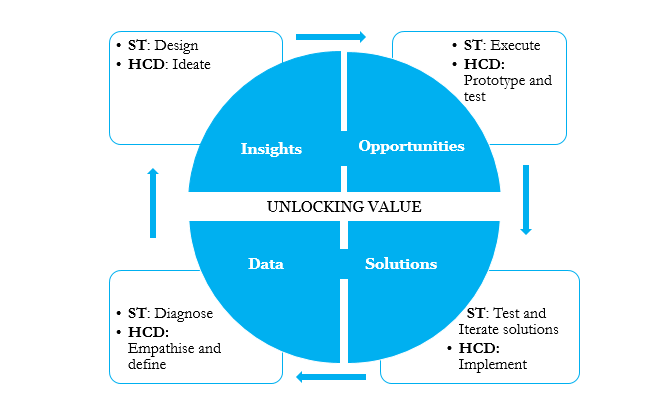Many approaches have been proposed by different scholars and practitioners in an attempt to address complex societal problems. Two of the most prominent are the systems thinking and human centered design approaches.
Systems Thinking: Systems thinking provides holistic insights on the inherent system relationships, enabling and disabling factors for a potential intervention. It is indeed important in unravelling the complexity of systems to better understand the systems-wide effects, positive and negative, planned and unintended consequences of different interventions, policies, and behaviours allowing practitioners to determine potential leverage points when designing interventions.
Human Centered Design: Human centered design (HCD) places people and communities at the core during the design and execution of problem solving initiatives. HCD has a primary focus on understanding the holistic needs of people in addition to promoting co-creation, iteration and experimentation of solutions that are relevant to communities based on their contextual realities. HCD transcends the explicit needs, and uncovers deeper, implicit needs allowing leaders to design solutions with meaning and emotional connectedness.
Weakness of Each Method
Each of these approaches provides a unique contribution, but insufficient when applied independently due to inherent drawbacks. HCD with its focus on placing people at the core during problem solving may lead to downstream consequences for other stakeholders or society as a whole especially when enacting solutions with potentially pervasive and knock on effects. You might also create solutions that address the symptoms of a problem by overlooking opportunities that fix the root causes. On the other hand, when you practice systems thinking without including the prototyping mindsets of design thinking, implementation of solutions can be more difficult. You may overlook the individual human needs and behaviors that you uncover with design thinking.

Below is a description of how Bodmando Consulting Group utilizes the systems thinking and HCD lens to address complex community problems.
Systems thinking (Diagnose): Here, we carry out a stakeholder analysis, engagement planning and root cause analysis to diagnose and understand systems, identify constraints and potential leverage points.
HCD (Empathize and Define): We assess and understand the real human experiences. During this phase, we want to discover the client’s “pain points” or problems from a humanistic perspective. Pain points can be explicit or latent. We delve deeper by actively observing and listening to uncover the latent pain points for transformative innovation.
Systems thinking (Design): We envision strategies and interventions to address the causes of organisational/community problems, map to leverage points and prioritise.
HCD (Ideate): We use design-thinking skills such as systematic inventive thinking (SIT) or brainstorming. We jointly generate insights from a humanistic perspective in collaboration with organizations and communities.
Systems thinking (Execute): We execute a coordinated and collaborative intervention to address community problems with the inclusion of programme partners and communities.
HCD (Prototype and Test): We evaluate concepts and create prototypes based on ideas generated during the ideation phase. Testing involves getting feedback from users by exposing them to the prototypes. The goal is to gather insights on what works and what doesn't.
Systems thinking (Test and Iterate solutions): We test and iterate solutions, assess changes continuously and conduct course correction where necessary.
HCD (Implement): Once a solution has been refined through prototyping and testing, it is ready for implementation. This phase involves scaling up the solution and integrating it into the intended context.
+256200903851 / +256708792579
info@bodmando.org
First floor, Biira Hilltop Plaza, Kagoma, P.O BOX 112949, Wakiso district, Central Uganda
+256200903851
info@bodmando.org
Neema Drive, Kasarani subcounty, Nairobi, Kenya
© 2025 Bodmando Consulting Group. All Rights Reserved. Headquartered in Uganda | Regional Office in Kenya